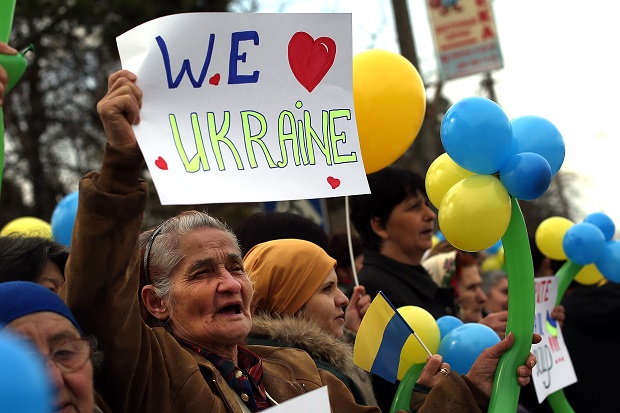Crimea’s Tatars are nervous after Russia’s annexation of the territory. The Tatars, Sunni Muslims who account for 12 per cent of Crimea’s population, boycotted Sunday’s referendum worried that the Russians would impose repressive and discriminatory laws on them. Reading Bohdan Nahaylo’s 1980 article, Murder of a Nation*, you can see why.
First, Stalin deported the entire Crimean Tatar nation.
‘In the early hours of 19 May 1944, some 238,000 people were abruptly awoken by units of the Soviet security forces and within minutes herded into cattle trucks. Sealed in without food or water, they were transported several thousand miles eastwards and eventually dispersed in Soviet Central Asia. Denounced before the local population as traitors who had collaborated en masse with the Germans, the Crimean Tatars were left to fend for themselves in the harshest of conditions. Their losses were appalling. The Crimean Tatars estimate that they lost 46 per cent of their population as a result of the deportation and the privations that followed.’
Twenty three years later, the Soviet authorities acknowledged that the Tatars had not in fact collaborated en masse with the Germans, but they still weren’t allowed to return to Crimea. Thousands tried, and thousands were expelled. By the late 1970s, barely one per cent of Crimean Tatars had been allowed to register as resident there. They were forcibly evicted, their houses sometimes destroyed, and activists were imprisoned.
In 1980, Ayshe Seytmuratova was the Crimean Tatars’ only representative outside the Soviet Union. ‘A small, attractive human dynamo’, she’d only been allowed out of the country because she’d threatened to burn herself in front of the Kremlin. ‘Unknown to me, only a few days earlier, Musa Mamut [a 46-year-old father of three] had burnt himself to death in the Crimea,’ she said. ‘The authorities apparently panicked. They decided they didn’t want to create another martyr and let me go.’ Now she was fiercely lobbying western governments and human rights groups, trying to draw the world’s attention to the plight the Tatars.
‘Ayshe’s story is very much the story her people. As a six-year-old child she lived through the trauma of deportation. At school she was constantly told that the Crimean Tatars were traitors, yet she knew that her father had been killed at the front defending the Soviet Union and that her uncle had been shot by the Germans. She became actively involved in the Crimean Tatar movement in the mid-1960s while studying history at Samarkand University. Showing great courage and determination, she travelled to Moscow to lobby the authorities, signed petitions, collected information on the trials of activists, documented cases of discrimination and maintained links with Russian and Ukrainian dissenters. Her activities resulted in three arrests and a three-year term of imprisonment.’
Now she was in the West, she’d managed to get the Council of Europe to pass a memorandum charging the Soviet Union with ‘cultural genocide’. She was feeling optimistic that more and more, the human rights movement would rally behind the Tatars.
‘With great conviction, Ayshe argues that the Crimean Tatars are the Soviet Union’s Palestinian problem. She hopes that one day a Crimean Tatar representative will be allowed to address the UN General Assembly as Yassir Arafat was. ‘Of course,’ she promptly adds, ‘the Crimean Tatars have never used or advocated violence in all their long years of campaigning. Our struggle will continue, for the alternative is the slow murder of a nation.’’
* I have reproduced longer sections of this article than usual as the link to the original article is broken. The only way to read it in full is by clicking on zoom page in the black square to the right of the page.






Comments